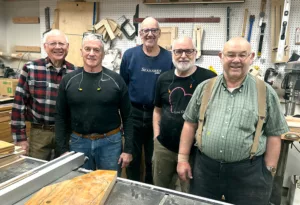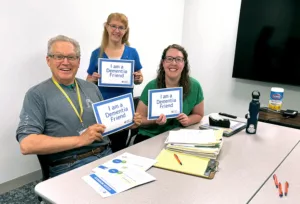
Home » Nontribal casinos dwindling
Nontribal casinos dwindling
Only seven of 11 are still operating in Spokane County
February 26, 1997
Nontribal gaming operations are having a tough time surviving in Spokane County because of a mix of regulatory and competitive pressures, industry representatives say. Four casinos have shut down over the last five years and others are struggling to turn a profit, raising the specter of other closures as well.
At the same time, the nearest tribal casino, Northern Quest Casino, in Airway Heights, steadily has expanded its operations. It now has 1,200 employees, 1,225 electronic games, and 39 gaming tables, says Phil Haugen, executive director of the Kalispel Tribe Gaming Agency.
Like a bell curve, the number of licensed house-banked card rooms in Spokane County rose annually from 1997 until 2000, and has since dropped off. It was 1997 when the state of Washington legalized house-banked card rooms, and December 2000 when Northern Quest Casino, owned by the Kalispel Tribe of Indians, entered the local gambling market. The terms house-banked card rooms and casinos are used interchangeably in this story.
The number of such card rooms that report their revenues to the state grew here from six in 1997 to 11 in 2000, and was reported at eight in mid-May by the Washington state Gambling Commission. Since then, Bluz at the Bend, at 2721 N. Market, has closed its gambling operations.
Representatives from three of the seven house-banked card rooms currently operating in Spokane County say competition from Northern Quest, anti-smoking regulations, and taxes assessed by local government entities are making it difficult to stay in business.
House-banked casinos differ from fee-collected card rooms that were common before 1997 and still exist in other parts of the state. Unlike house-banked casinos, in which the casino sells chips to players to use when they play card games, fee-collected card rooms charge gamblers for each half-hour they sit in a gambling seat.
Robert Varney, a spokesman for Bluz at the Bend, which got state approval to operate a house-banked casino in October 2004, says that establishment closed its gambling operations because gaming didnt provide enough volume to pay the overhead.
Its difficult to blame it on the Indians, he says, but the smoking ban didnt help. Our revenues dropped off about 30 percent almost immediately after the smoking ban (was enacted).
Casinos typically win a statewide average of about 26 percent of how much money each banks when players buy chips, but normal operating expenses such as labor, taxes, and food and alcohol cut into those profits, says Scott Walker, director of gaming for Hooters Owl Club Casino, at 16208 E. Indiana.
Jim Foxy Hargrove, an owner of Annie Fannies Bar Grill & Casino, at 3827 E. Boone, says, Its not an equal playing field. He notes that Northern Quest and other Indian-operated casinos in the state can offer games of chance such as craps and roulette, and also electronic lottery machines for gambling purposes, all of which are prohibited in house-banked card rooms. Instead, legalized gambling in those businesses is basically restricted to table games such as blackjack, three-card poker, and Spanish 21.
Hargrove also says casinos have been hurt by the initiative that outlawed smoking within 25 feet of any public building. Northern Quest isnt bound by that state law and still allows smoking at designated areas on its premises.
After Annie Fannies was sanctioned as a house-banked card room in 1998, business started slowly, gained momentum, then peaked before more and more competition, including Northern Quest, entered the market, Hargrove says. Revenues began to dip, and, he says, The smoking ban was the straw that broke the camels back, although Annie Fannies is still in business. He says gambling proceeds account for 60 percent of the businesss revenue, and 60 percent of that revenue was lost almost immediately following enactment of the smoking ban.
H. T. Higgins, president of Big Daddys, at 3023 E. 28th, and a former president and CEO of Players & Spectators, at 12828 E. Sprague, which are both operating casinos here, says, People in the industry want to fault the tribes, but its not about them. Theyve done a great job. They are in a position where they have a monopoly, and its difficult to compete with a monopoly.
He says Players & Spectators, where he worked when Northern Quest opened, lost 40 percent of its overall revenue in the first six months after the tribal casino opened. He says whats called the drop, the amount of money banked with the house when gamblers buy chips to play card games, peaked at $50,000 a day in February 2000 at Players & Spectators, and since then has fallen to $20,000 a day.
Northern Quest continues to grow, says Higgins. We cant compete with their food giveaways and the entertainment they bring in.
Hooters Owl Club only opened a year ago, but since has been hurt by the smoking ban.
We havent been hit as bad as other casinos here, Walker says. We lost about 10 percent of our revenue when the smoking ban was first imposed, but after a couple months those gamblers started coming back.
He argues that the tribes have an advantage because electronic lottery machines cost little to maintain, compared with the gaming tables at house-banked casinos that are very labor intensive.
Walker says the distance from the Owl Club to Northern Quest, about 25 miles, is most definitely a factor that deters some gamblers from driving to Airway Heights, and causes many to spend their gambling hours in the Valley.
In 1981, the state of Washington authorized local governments to collect taxes of up to 20 percent of each gambling establishments reported gross revenue.
Spokane County assessed a 15 percent gambling tax until 2003 when Spokane Valley incorporated as a city, and all of the casinos that had been in the county were absorbed into that new city, says Mike Volz, finance manager for the county. He says the countys tax proceeds from house-banked card rooms dropped from a high of more than $1.2 million in 2000 to zero.
The city of Spokane Valley has maintained a 10 percent gambling tax since it incorporated, and collected about $680,000 in 2004, its first full year, and about $860,000 in 2005, says Ken Thompson, finance director for Spokane Valley.
Walker says Hooters Owl Club is paying the city of Spokane Valley about $28,000 in gambling taxes each month.
Meanwhile, Spokane County, to attract new casinos, lowered its gambling tax to 2 percent in October last year, Volz says.
The only casino that has relocated to the county since it took that step was Aces Casino Club North, at 6301 N. Division, which moved from Spokane Valley to the county.
Higgins says, When the county lowers the tax to 2 percent and there are hardly any entries in the market, thats an indicator that gambling casinos isnt a great business to get into.
The city of Spokane, which had historically taxed card rooms the maximum 20 percent, decided to lower its gambling tax as well. The Spokane City Council voted to reduce its gambling tax to 15 percent effective Jan. 1 of this year, and reduce it further to 10 percent effective Jan. 1, 2007.
The City Council action followed lobbying by casinos within the city and by people such as Higgins, who says, Without the lowering of the tax, we (at Big Daddys) would have closed. He says Big Daddys paid $600,000 in gambling taxes to the city of Spokane in 2005.
Although the city of Spokane doesnt keep records that go back farther than 2000, its gambling tax receipts were at about $1.8 million in 2000, and since then revenues have fluctuated from a high of $1.7 million to a low of $1.1 million, says Lisa Dillmann, tax and license specialist for the city.
Northern Quest
While house-banked casinos can be taxed up to 20 percent of their gross revenue, Northern Quest and the 28 other federally recognized casinos in the state are handled differently.
Haugen, of the Kalispel Tribe Gaming Agency, says, Economically, the tribe was ready to file for bankruptcy prior to the casino opening.
The tribe, in an agreement to help cover the citys costs of providing services there, paid the city of Airway Heights $374,000 in 2005 alone, and it gave another $800,000 to charities last year, says Haugen. The money came from a 0.5 percent assessment on lottery-machine receipts included in the Kalispels compact with the state, and an amount above that the tribe voted to share, says Haugen.
The Kalispel Tribe also, under its state compact, pays an impact fee of 2 percent of its gross table game revenue to the fire and police departments of Airway Heights and Spokane County, he says.
A longtime activist for the gaming industry, Higgins says he and others worked hard in 2003 to place an initiative before statewide voters that would have expanded the use of electronic lottery machines, which are similar to slot machines, so they could be used in private casinos as well as tribal casinos. The proposal called for the state to use some of the money generated from those electronic games to help offset property taxes, but the initiative was defeated soundly.
Along with the others already mentioned, local house-banked card rooms still in operation here are Classic Rock Casino, at 1112 E. Magnesium Road, and Ringos Little Vegas, at11420 E. Sprague.
Contact Rocky Wilson at (509) 344-1264 or via e-mail at [email protected].
Latest News
Related Articles




